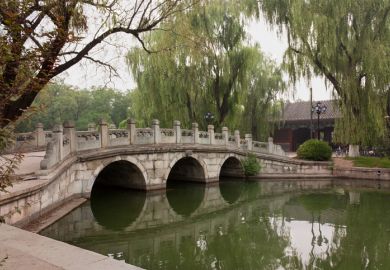Scholars have warned that the state of academic freedom in China is “going from bad to worse” after the president of one of the country’s leading universities was ousted and replaced by a Communist Party chief.
Last month, Lin Jianhua was suddenly removed from his position as president of Peking University, with state officials claiming that he was “past retirement age”. He was replaced by Hao Ping, a professor and former Communist Party secretary of the institution who had previously served as a vice-minister of education in the country.
The university has received criticism in recent months over its handling of a decades-old allegation, which came to light as a result of the #MeToo movement, that a former lecturer raped a student who later committed suicide. Alumni had called for Professor Lin to resign, but it is unclear whether this was a factor in his removal.
Christopher Balding, a US academic and critic of the Chinese government who lost his post as an associate professor at Peking University HSBC Business School earlier this year – and subsequently left the country citing fears for his safety – said that there has been “increasing party control over universities for some time”.
“Academic freedom in China is clearly on the retreat,” he said. “I have been told of other universities where the party has taken significantly more control and taken action against foreign or Chinese academics. The idea that the party is not pre-eminent in the management of a university is just false.”
Kevin Carrico, lecturer in Chinese studies at Australia’s Macquarie University, said that “academic freedom was already in quite dire straits in China” but “the recent personnel changes at Peking…suggest that the situation is going from bad to worse – even worse than pessimists like myself would have expected”.
“The fact that someone with such close links with the party-state apparatus – the same apparatus imprisoning millions in Xinjiang and eliminating civil society throughout China – should become the head of Peking University, one of the best universities in China and ostensibly a top global university, highlights just how serious the already quite distressing political environment in China has become, and makes a mockery of hard-working academics there who simply want to think and speak freely like their colleagues elsewhere,” he said.
Peking was placed 31st in the latest Times Higher Education World University Rankings.
Hans van de Ven, professor of modern Chinese history at the University of Cambridge, said that universities in China are “being purged and have to toe the party line”, adding that “it is tragic that Peking University, the most important university that has done most to make the case for academic autonomy, is now suffering the consequences of these developments”.
Jonathan Sullivan, director of the University of Nottingham’s China Policy Institute, said that the “coupling of party and university administration” has previously “been avoided” and Dr Hao is “well qualified for the job politically and as an education professional”.
However, he added that the presidential reshuffle, “if it were designed to signify closer party control in higher education, would be compatible with the broader atmosphere of increasing circumscriptions in the sector”.
“Given that this is Peking, not only the top university but the most politically symbolic, it could be interpreted as giving the green light to other institutions to follow suit, but that is speculation on my part,” he said.
Register to continue
Why register?
- Registration is free and only takes a moment
- Once registered, you can read 3 articles a month
- Sign up for our newsletter
Subscribe
Or subscribe for unlimited access to:
- Unlimited access to news, views, insights & reviews
- Digital editions
- Digital access to THE’s university and college rankings analysis
Already registered or a current subscriber?








